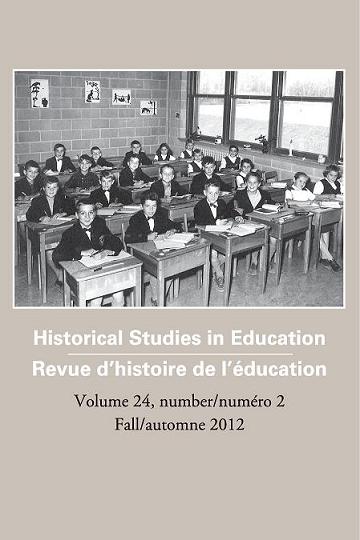Le financement des écoles publiques à Montréal et à Toronto (1841-1997) : Un baromètre pour mesurer les rapports entre la majorité et la minorité
- FRANCOPHONES,
- ANGLOPHONES,
- PROTESTANTS,
- CATHOLIQUES,
- ÉTAT
- FINANCEMENT SCOLAIRE,
- TAXE SCOLAIRE,
- SUBVENTIONS GOUVERNEMENTALES,
- ÉCOLES PUBLIQUES,
- ÉCOLES SÉPARÉES,
- ÉCOLES CATHOLIQUES,
- ÉCOLES PROTESTANTES,
- ENSEIGNEMENT SECONDAIRE ...More
Abstract
RÉSUMÉ
Cette étude propose d’examiner les modes de financement scolaire à Montréal et à Toronto, entre 1841 et 1997, sous l’angle sociopolitique d’un baromètre pour mesurer les rapports sociaux entre la majorité et la minorité. Il ressort de nos recherches que l’État provincial ontarien accorde, avant les années 1960, la primauté aux écoles publiques qui disposent à la fois de la reconnaissance politique et de l’accès aux ressources financières, tandis que les écoles séparées sont soumises à des contraintes légales et financières qui les confinent à un espace social dévolu à la minorité. À l’opposé, le gouvernement québécois reconnaît l’égalité et l’autonomie des acteurs catholiques et protestants, tant sur les plans administratif, pédagogique que financier. Ainsi, il apparaît que la scène scolaire constitue un espace névralgique de discussions, de négociations et même d’affrontements entre les différents groupes religieux et culturels pour faire valoir leurs conceptions éducatives et obtenir l’accès aux ressources financières.
ABSTRACT
This study proposes to examine the ways in which schools were financed, both in Montreal and Toronto, between 1841 and 1997, from the perspective of a socio-political barometer measuring the social relationships between majority and minority. It is clear from our research that prior to the 1960s the Ontario provincial government gave priority to public schools, providing both political recognition and access to financial resources, while separate schools were subjected to financial and legal constraints and confined to the social space vested to the minority. In contrast, the Quebec government recognized the equality and autonomy of actors both Catholics and Protestants on administrative, educational, and financial levels. Thus, the educational scene appears to be a space that is sensitive to discussions, negotiations, and even clashes between different religious and cultural groups, where each can promote their conceptions of education and gain access to financial resources.
